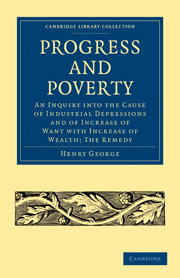 Progress and Poverty
Progress and Poverty Book contents
- Frontmatter
- PREFACE TO FOURTH EDITION
- Contents
- INTRODUCTORY
- BOOK I WAGES AND CAPITAL
- BOOK II POPULATION AND SUBSISTENCE
- BOOK III THE LAWS OF DISTRIBUTION
- BOOK IV EFFECT OF MATERIAL PROGRESS UPON THE DISTRIBUTION OF WEALTH
- BOOK V THE PROBLEM SOLVED
- BOOK VI THE REMEDY
- BOOK VII JUSTICE OF THE REMEDY
- BOOK VIII APPLICATION OF THE REMEDY
- BOOK IX EFFECTS OF THE REMEDY
- Chapter I Of the effect upon the production of wealth
- Chapter II Of the effect upon distribution and thence upon production
- Chapter III Of the effect upon individuals and classes
- Chapter IV Of the changes that would be wrought in social organization and social life
- BOOK X THE LAW OF HUMAN PROGRESS
- CONCLUSION
- INDEX
Chapter III - Of the effect upon individuals and classes
Published online by Cambridge University Press: 07 September 2011
- Frontmatter
- PREFACE TO FOURTH EDITION
- Contents
- INTRODUCTORY
- BOOK I WAGES AND CAPITAL
- BOOK II POPULATION AND SUBSISTENCE
- BOOK III THE LAWS OF DISTRIBUTION
- BOOK IV EFFECT OF MATERIAL PROGRESS UPON THE DISTRIBUTION OF WEALTH
- BOOK V THE PROBLEM SOLVED
- BOOK VI THE REMEDY
- BOOK VII JUSTICE OF THE REMEDY
- BOOK VIII APPLICATION OF THE REMEDY
- BOOK IX EFFECTS OF THE REMEDY
- Chapter I Of the effect upon the production of wealth
- Chapter II Of the effect upon distribution and thence upon production
- Chapter III Of the effect upon individuals and classes
- Chapter IV Of the changes that would be wrought in social organization and social life
- BOOK X THE LAW OF HUMAN PROGRESS
- CONCLUSION
- INDEX
Summary
When it is first proposed to put all taxes upon the value of land, and thus confiscate rent, all landholders are likely to take the alarm, and there will not be wanting appeals to the fears of small farm and homestead owners, who will be told that this is a proposition to rob them of their hardearned property. But a moment's reflection will show that this proposition should commend itself to all whose interests as landholders do not largely exceed their interests as laborers or capitalists, or both. And further consideration will show that though the large landholders may lose relatively, yet even in their case there will be an absolute gain. For, the increase in production will be so great that labor and capital will gain very much more than will be lost to private land ownership, while in these gains, and in the greater ones involved in a more healthy social condition, the whole community, including the land owners themselves, will share.
In a preceding chapter I have gone over the question of what is due to the present landholders, and have shown that they have no claim to compensation. But there is still another ground on which we may dismiss all idea of compensation. They will not really be injured.
It is manifest, of course, that the change I propose will greatly benefit all those who live by wages, whether of hand or of head—laborers, operatives, mechanics, clerks, professional men of all sorts.
- Type
- Chapter
- Information
- Progress and PovertyAn Inquiry into the Cause of Industrial Depressions and of Increase of Want with Increase of Wealth; The Remedy, pp. 402 - 407Publisher: Cambridge University PressPrint publication year: 2009First published in: 1881


